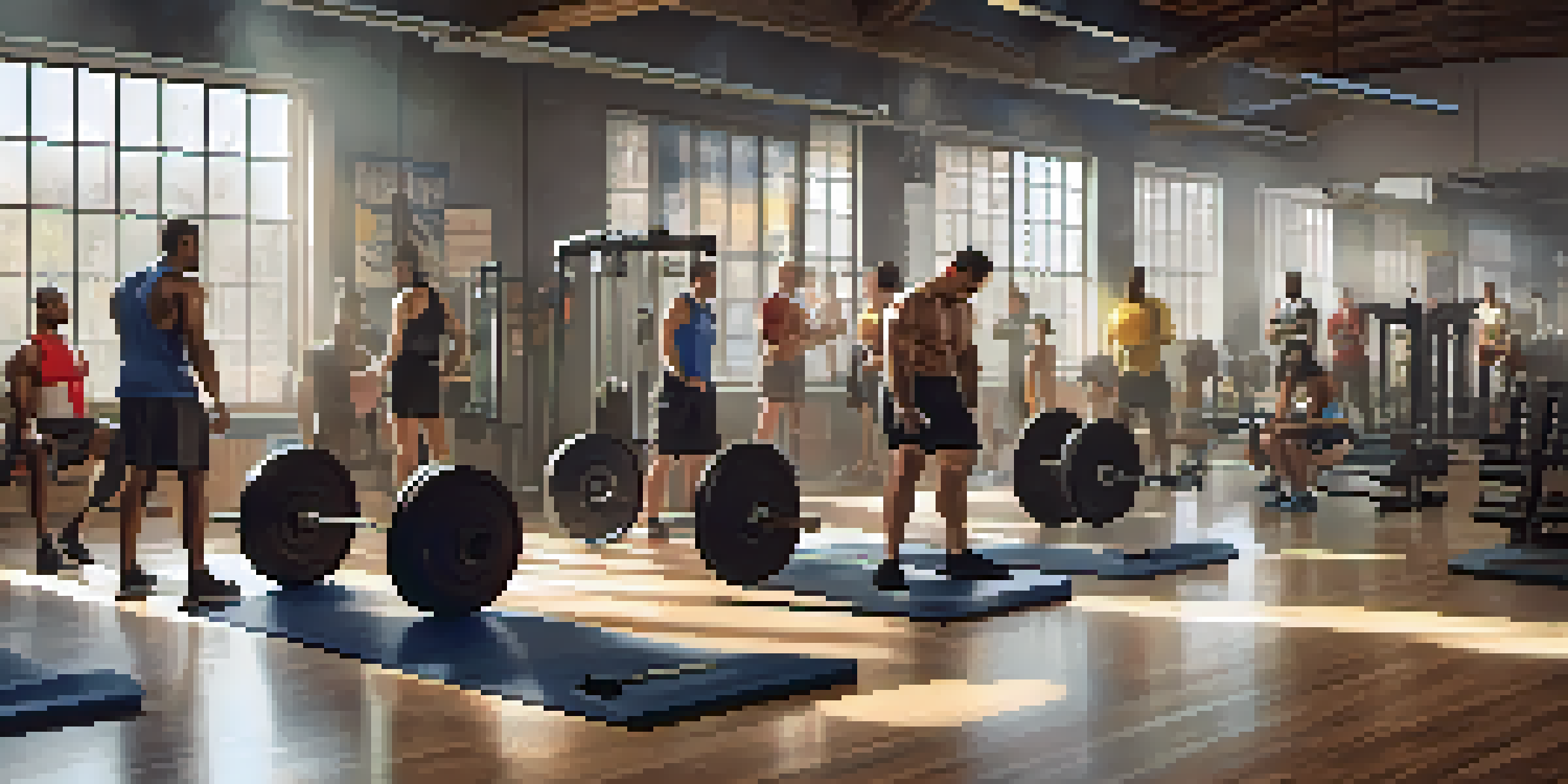Understanding Testosterone's Role in Muscle Growth and Recovery

What is Testosterone and Why is it Important?
Testosterone is a hormone primarily produced in the testes in men and in smaller amounts in women's ovaries. It's crucial not only for reproductive health but also for muscle growth, bone density, and overall vitality. Think of testosterone as a fuel for your body; without it, you might struggle to gain muscle or recover from workouts effectively.
Testosterone is not just a hormone; it's a key player in overall health and fitness.
This hormone plays a significant role in protein synthesis, which is the process your body uses to build and repair muscle tissue. Higher testosterone levels are often linked to increased strength and muscle mass. So, when you lift weights or engage in resistance training, testosterone helps your body adapt and grow stronger.
In addition to its role in muscle development, testosterone influences mood and energy levels. Low testosterone can lead to fatigue, irritability, and a lack of motivation, which can indirectly affect your workout performance. Ultimately, understanding testosterone's importance can help you optimize your fitness journey.
How Testosterone Affects Muscle Growth
Testosterone promotes muscle growth through its anabolic properties, which means it helps build tissues, including muscle. When you engage in strength training, testosterone levels increase, signaling your body to grow and repair muscle fibers that have been stressed during workouts. This is why many athletes and bodybuilders focus on maintaining healthy testosterone levels.

Moreover, testosterone enhances the effectiveness of other hormones such as growth hormone and insulin-like growth factor 1 (IGF-1), which also contribute to muscle growth. It’s like a team effort where testosterone leads the charge, ensuring that all players work together for optimal results. This synergy is crucial for anyone looking to maximize their gains.
Testosterone Fuels Muscle Growth
Testosterone plays a crucial role in protein synthesis and muscle recovery, making it essential for building strength and muscle mass.
Additionally, testosterone helps reduce body fat, which can improve muscle visibility and overall physique. When you have lower body fat, your muscles appear more defined, giving the impression of greater size and strength. Thus, maintaining balanced testosterone levels is essential for achieving a well-rounded, muscular appearance.
The Role of Testosterone in Recovery
Recovery is a vital part of any fitness regimen, and testosterone plays a key role in this process. After a workout, your muscles need time to repair and grow, and testosterone helps accelerate this recovery phase. It aids in reducing muscle damage and inflammation, allowing you to bounce back faster and more effectively.
Understanding the balance of hormones is crucial for optimal performance and recovery.
Moreover, higher testosterone levels can lead to improved sleep quality, which is crucial for recovery. Sleep is when your body does much of its healing and muscle repair. If you’re not getting enough restful sleep, your testosterone levels can dip, creating a cycle of fatigue and slower recovery.
It's worth noting that while testosterone can aid recovery, excessive exercise or inadequate nutrition can lead to lower testosterone levels. Striking a balance with your workouts, nutrition, and recovery is essential to keep those testosterone levels optimal, ensuring you can recover effectively and continue making progress.
Natural Ways to Boost Testosterone Levels
If you're looking to boost your testosterone levels naturally, there are several lifestyle changes you can make. Regular strength training is one of the most effective ways to increase testosterone. Engaging in compound movements, like squats and deadlifts, can stimulate hormonal responses that promote higher testosterone levels.
Diet also plays a crucial role in hormone regulation. Consuming a balanced diet rich in proteins, healthy fats, and essential nutrients can support testosterone production. Foods like eggs, nuts, and leafy greens can be particularly beneficial, acting as building blocks for hormone synthesis.
Natural Ways to Boost Testosterone
Regular strength training, a balanced diet, and stress management are effective lifestyle changes to naturally enhance testosterone levels.
Lastly, managing stress is vital for maintaining healthy testosterone levels. High stress can lead to elevated cortisol, a hormone that can negatively impact testosterone. Incorporating relaxation techniques like meditation, yoga, or even regular hobbies can help keep stress in check and support your overall hormonal health.
The Impact of Age on Testosterone Levels
As we age, our testosterone levels naturally decline, typically starting in men around their late 30s. This gradual decrease can affect muscle mass, strength, and overall energy levels. Understanding this change is essential for adapting your fitness regimen as you grow older.
For many, lower testosterone levels can lead to increased body fat and decreased muscle mass, making it more challenging to maintain a fit physique. It’s crucial to recognize that age-related changes in testosterone are normal, but they can be managed through lifestyle adjustments, such as regular exercise and a healthy diet.
Additionally, older adults might consider consulting healthcare professionals about their testosterone levels and potential treatments if necessary. Options like hormone replacement therapy can be discussed, but it's vital to weigh the benefits and risks with a qualified professional.
Myths and Misconceptions about Testosterone
There are many myths surrounding testosterone, particularly in the realm of fitness. One common misconception is that only bodybuilders need to worry about their testosterone levels. In reality, testosterone affects everyone, regardless of fitness goals. It plays a role in everyday energy levels, mood, and overall health.
Another myth is that higher testosterone always leads to better athletic performance. While testosterone is crucial for muscle growth, too much can actually lead to negative side effects, including aggression or increased risk of injury. It’s all about balance; having optimal levels is key, rather than excessively high levels.
Age Affects Testosterone Levels
As men age, testosterone levels decline, impacting muscle mass and energy, but lifestyle adjustments can help manage these changes.
Lastly, some people believe that testosterone can only be increased through synthetic means, like steroids. However, as we discussed, there are many natural ways to support testosterone levels through lifestyle choices, such as diet and exercise. Understanding these myths can help you approach your fitness journey with a more informed perspective.
Conclusion: Embracing Testosterone for Optimal Fitness
In conclusion, testosterone plays a pivotal role in muscle growth, recovery, and overall well-being. By understanding its effects and how to naturally support your testosterone levels, you can enhance your fitness journey. Whether you’re a seasoned athlete or just starting out, recognizing the importance of this hormone is essential.
Maintaining a balanced lifestyle that includes strength training, a healthy diet, and effective stress management can help you keep your testosterone levels in check. Remember, it’s not just about lifting weights; it’s about creating a holistic approach to your health and fitness.

As you continue on your fitness journey, keep these insights in mind. Embracing the role of testosterone can lead to improved performance, better recovery, and ultimately, a stronger, healthier you.